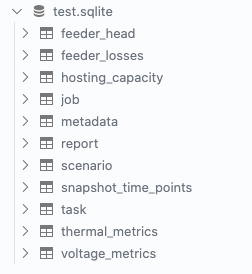Data Ingestion¶
DISCO can ingest simulation metrics and analysis results into a sqlite database, which facilitates data sharing between researchers and data query for further investigation.
Ingest to New Database¶
Suppose we are assigned a task which requires us to run a DISCO pipeline for
static hosting capacity analysis and the generated pipeline output directory
is /data/snapshot-output/.
Run the command below to ingest the results into a database.
$ disco ingest-tables --task-name "SFO P1U Snapshot" --model-inputs /data/input-models/ --database=test.sqlite /data/snapshot-output/
It will create a database named test.sqlite with data tables like below,

Ingest to Existing Database¶
Now we are assigned a second task, and need to run DISCO pipeline for dynamic hosting capacity.
We generated the output directory /data/time-series-output.
Again, we would like to ingest the data into a database.
We have two choices for data ingestion:
Ingest the results into a new database, let’s say,
data.sqlite.Ingest the results into an existing database, for example, the one we created above
test.sqlite.
If choose option 1, then just run the command above with new --database value specified.
Here, we would like to choose option2, and ingest the results of second task into an existing database,
test.sqlite created before. To perform this, we need to assign --task-name a different value,
otherwise, it would prevent the data ingestion, as the task for each ingestion must be unique.
$ disco ingest-tables --task-name "SFO P1U Time-series" --model-inputs /data/input-models/ --database=test.sqlite /data/time-series-output/
Note
Task names must be unique. It’s recommended to use a naming convention like this: <geography> <simulation_type>.
Run Database Queries¶
Create a db connection,
import sqlite3
conn = sqlite3.connect("test.sqlite")
Run sql query with pandas,
import pandas as pd
query1 = "SELECT * FROM task"
df = pd.read_sql_query(query1, conn)
For more query examples, please refer to the Jupyter notebook in this repository db-query.ipynb.